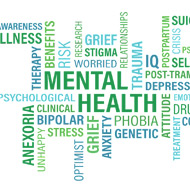
Vetlife's Rosie Allister discusses wellbeing at congress
Mental health among veterinary surgeons has been increasingly discussed in recent years, and there have been a number of surveys and research projects on the topic.
However, there is a lack of peer reviewed evidence on VN wellbeing and stress, said Rosie Allister, the manager of Vetlife helpline.
There is no reason to believe that the prevalence of mental health issues is significantly different in veterinary nurses, but there is a need for research to determine accurate figures.
A BVA survey has revealed common reasons for stress in the veterinary profession; many of which apply to veterinary nurses too. They include financial issues, working hours, workplace relations, responsibility for animals' lives and lack of time to complete work.
Carrying out her own study on factors affecting wellbeing, Rosie found the 'top four' factors were: going to far (being pressured to over-treat), clients who won't pay, brachycephalics, and being forced to oversell.
Rosie believes VNs may be even more vulnerable to compassion fatigue than vets, as they have less autonomy over cases.
We need to talk
Vetlife is projected to receive just over 1,700 calls or emails this year. Of these, just 450 will be from veterinary nurses, which Rosie said is unlikely to mean that VNs need less help, but perhaps suggests many are unaware that the service is now available to them.
Rosie also emphasises the importance of being able to talk about suicide in the profession. She said she has been asked to give 'positive' talks on wellbeing, without mentioning suicide, which she always refuses. And she cautions against the view that suicide is 'inevitable' in some cases. It is preventable, if the person receives the right help in time.
How to help colleagues
During her talk, she provided tips for helping colleagues who may be suffering from mental health issues.
First of all, take distress seriously. It will have taken a colleague a great deal of courage to talk to you, so be patient, listen and don't judge - just ask how you can help. Support them in seeking the necessary support, whether from Vetlife, a GP or emergency services if necessary. And if you are really worried, stay with them until they get the help they need. Finally, remember to look after yourself too.
Sleep
Sleep is of great importance, and this is something Rosie campaigns on. Research shows moderate sleep deprivation (being awake for 16-18 hours a day) has the same effect as being at the legal limit for blood-alcohol levels in England.
A fifth of road traffic accidents are fatigue related, and these accidents are significantly more likely to result in serious harm or death. Poor sleep is also associated with increased risk of a number of health conditions.
Rosie urged practices to have a policy in place to prevent employees driving home when they are too tired; for example providing somewhere for them to sleep at the practice or funds for a taxi home.
She also warned delegates about the '4am dip' which is known for poor functioning, so it is wise to check and double check everything you do at this time. Bright lighting in non-clinical areas of the practice is helpful.
Finally, some general tips for wellbeing:
1. Connect with others
2. Take notice. Live in the moment.
3. Keep learning - something non-veterinary, that makes you feel competent.
4. Give. Kindness is associated with positive wellbeing.
5. Exercise regularly - for 150 minutes a week.



 The RCVS has announced a new version of its 1CPD mobile app, with enhanced features for veterinary surgeons and veterinary nurses to record their continuing professional development.
The RCVS has announced a new version of its 1CPD mobile app, with enhanced features for veterinary surgeons and veterinary nurses to record their continuing professional development.